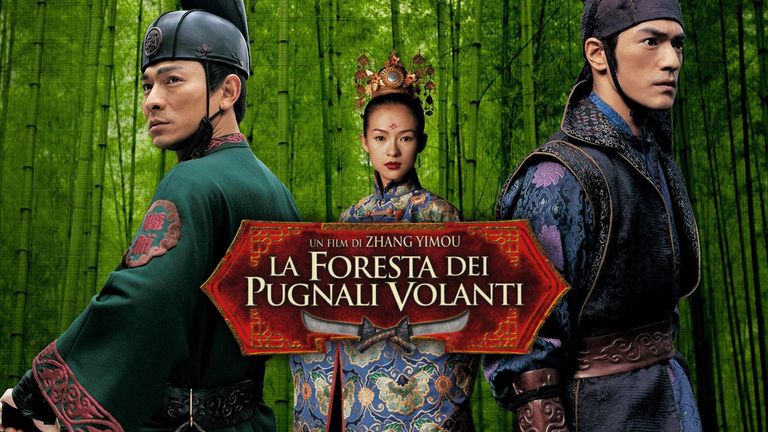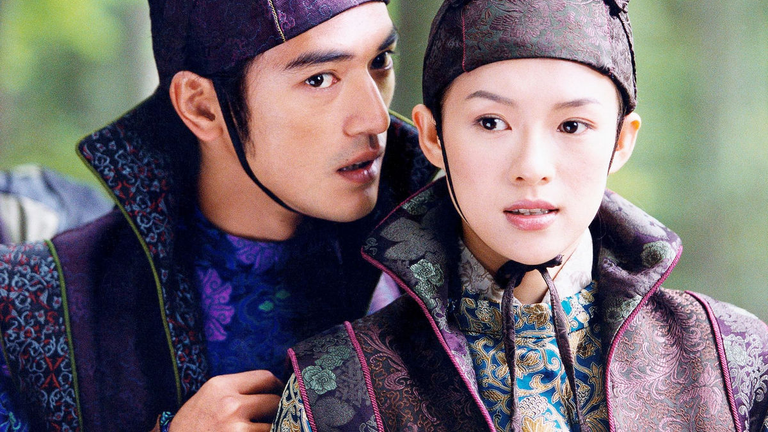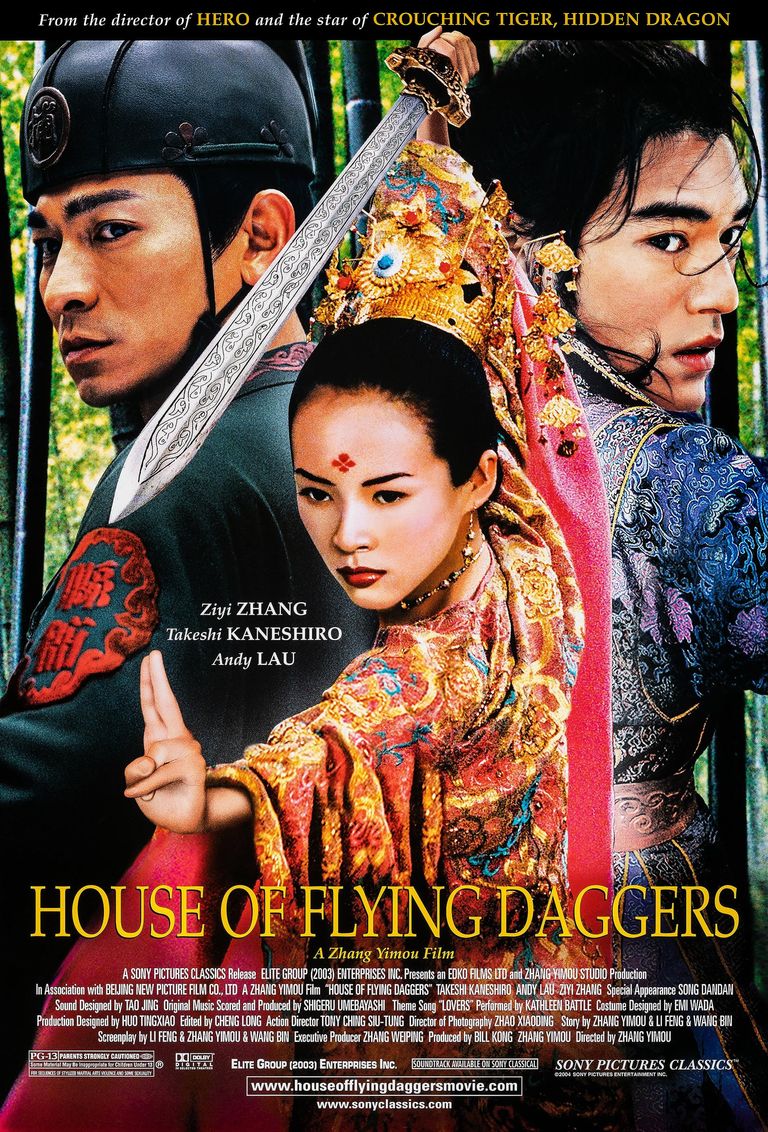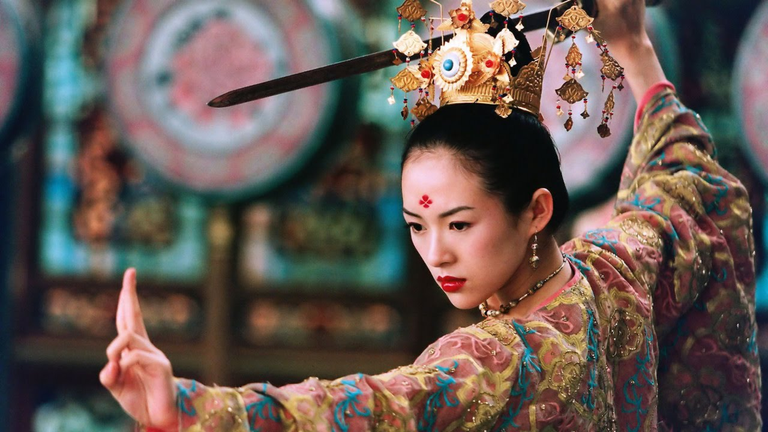
Today I want to share with all of my #BLURT film-loving friends one of the best films, from an aesthetic and scenographic point of view, that I have seen in recent years.
But first I want to make a couple of clarifications.
a) Because of my continuous wandering I have lived in different countries (I have just spent a couple of years in the USA) where I was surprised by the coronavirus pandemic, but I have also lived many times in Europe.
b) For this reason I speak and understand without problems several languages, among them -apart from Spanish- Italian and partially French and English.
c) Because of this I watch some movies in their original language which allows me to enjoy the real character.
Having made these clarifications I am going to share with all the users of this splendid community a fantastic movie from the point of view of scenography and special effects, but also with the culture of Asian cinema: I am talking about House of Flying Daggers (in Chinese its original language is called 十面埋伏 I saw it in Italian because at that time I lived in that country and the title in Italian is La Foresta dei Pugnali Volanti).
It is a film that can be framed in the so-called "wuxia" film genre, which is a broad genre of Chinese literary type that has its origins in the early twentieth century and brings together the adventures of martial heroes of the Chinese tradition, something comparable to the classic titles of "cloak and dagger" that delighted us so much when we were children.

Being of Hispanic origin (Argentinian) I have always struggled with the feeling of not being able to understand the dubbing of movies. Either because they have a slightly Puerto Rican accent (at one time all dubbing for Latin America was done in that country or with professionals and/or actors from that country. Or because they have an absolutely neutral accent like nowadays. Or because they have a strong Spanish accent as it happened for years.
That is to say, very few times I saw films dubbed in Spanish-Argentine with the characteristic accents of my country of origin.
Living many years in Italy I discovered something: the quality of Italian dubbing and book translators is simply exceptional.
Not only because Italian is a unique language with no particular inflections (except for dialects) but also because the dubbing of movies in this case is done by real actors and professionals, giving not only the tonality but also the emphasis to each dubbed action.

To put it in other words: you can't tell the difference between the dubbed action and the original action.
I have tried to make the experience between the original and the Italian translation and truly the emphasis is exactly the same, the interjections, exclamations, anguish, anxiety, joy, terror, action or suspense do not present variations from the interpretative point of view.
I think that is the main difference. The neutrality of the Spanish language that is adopted to standardize all Spanish-speaking countries takes away the spontaneity that the examples mentioned above have.
I have chosen House of Flying Daggers as my favorite foreign film.
Let's see why.
Zhang Yimou gives a master touch to a typical scenography of wuxia films: the bamboo jungles.
The warriors crossing this jungle that can serve as cages or real deadly weapons, in absolute silence is one of the best images of the film.
The dichotomy between action and romanticism gives us unforgettable moments of pain and humanity that impose, many times, the sacrifice of the personal aspirations of each character.
The impressive dance scenes with which the film opens are dazzlingly beautiful.
The fields of grain or the plains transformed into majestic snowy landscapes in their incredible and natural beauty also serve as a backdrop to the moral changes, highlighting the emotionality in some key scenes.
The visual delicacy of the scenes in general is extraordinary as well as the silence that surrounds them.
There is a notable improvement with respect to Hero, Zhang Yimou's other film, perhaps the one that gave him the greatest fame.
In this aspect the work of Tony Ching Siu-Tung, the choreographer to whom he entrusted the scenography of the film is fundamental.
Martial art stylizations, real combat techniques from the live with a lot of stunts and an extraordinary photography candidate for an Oscar only increase the interest for this great film.
To close the praise Zhang Ziyi, a veteran actress in this type of film is exhibited in a warrior dance for which there are not enough adjectives in quality to catalog it.

Hoy quiero compartir con todos los amigos cinéfilos de #BLURT una de las mejores películas, desde el punto de vista estético y escenográfico, que he visto en los últimos años.
Pero antes quiero hacer un par de aclaraciones.
a) Por mi continuo deambular he vivido en diferentes países (acabo de pasar un par de años en EEUU) donde me sorprendió la pandemia del coronavirus, pero también he vivido muchas veces en Europa.
b) Por ello hablo y entiendo sin problemas varios idiomas, entre ellos -aparte del español- italiano y parcialmente francés e inglés.
c) Por ello veo algunas películas en su idioma original lo que me permite disfrutar del personaje real.
Hechas estas aclaraciones voy a compartir con todos los usuarios de esta espléndida comunidad una película fantástica desde el punto de vista de la escenografía y los efectos especiales, pero también con la cultura del cine asiático: estoy hablando de La casa de las dagas voladoras (en chino su idioma original se llama 十面埋伏 la vi en italiano porque en esa época vivía en ese país y el título en italiano es La Foresta dei Pugnali Volanti).
Se trata de una película que se puede enmarcar en el género cinematográfico denominado "wuxia", que es un amplio género de tipo literario chino que tiene sus orígenes a principios del siglo XX y que reúne las aventuras de héroes marciales de la tradición china, algo comparable a los títulos clásicos de "capa y puñal" que tanto nos deleitaron cuando éramos niños.

Al ser de origen hispano (argentino), siempre he luchado con la sensación de no poder entender el doblaje de las películas. Ya sea porque tienen un acento ligeramente puertorriqueño (en un tiempo todos los doblajes para Latinoamérica se hacían en ese país o con profesionales y/o actores de ese país). O porque tienen un acento absolutamente neutro como hoy en día. O porque tienen un fuerte acento español como ocurrió durante años.
Es decir, muy pocas veces vi películas dobladas al español-argentino con los acentos característicos de mi país de origen.
Viviendo muchos años en Italia descubrí algo: la calidad de los doblajes italianos y de los traductores de libros es simplemente excepcional.
No solo porque el italiano es una lengua única sin inflexiones particulares (salvo los dialectos) sino también porque el doblaje de las películas en este caso lo hacen actores reales y profesionales, dándole no solo la tonalidad sino también el énfasis a cada doblaje. Acción.

En otras palabras: no se puede notar la diferencia entre la acción doblada y la acción original.
He intentado hacer la experiencia entre el original y la traducción italiana y verdaderamente el énfasis es exactamente el mismo, las interjecciones, exclamaciones, angustia, ansiedad, alegría, terror, acción o suspenso no presentan variaciones desde el punto de vista interpretativo.
Creo que esa es la principal diferencia. La neutralidad de la lengua española que se adopta para estandarizar todos los países hispanohablantes le quita la espontaneidad que tienen los ejemplos mencionados anteriormente.
Veamos por qué.
Zhang Yimou da un toque maestro a una escenografía típica de las películas wuxia: las junglas de bambú.
Los guerreros atravesando esta jungla que puede servir de jaulas o de auténticas armas mortales, en absoluto silencio es una de las mejores imágenes de la película.
La dicotomía entre acción y romanticismo nos regala momentos inolvidables de dolor y humanidad que imponen, muchas veces, el sacrificio de las aspiraciones personales de cada personaje.
Las impresionantes escenas de baile con las que se abre la película son de una belleza deslumbrante.
Los campos de grano o las llanuras transformadas en majestuosos paisajes nevados en su increíble y natural belleza también sirven de telón de fondo a los cambios morales, resaltando la emotividad en algunas escenas clave.
La delicadeza visual de las escenas en general es extraordinaria así como el silencio que las envuelve.
Hay una notable mejora con respecto a Hero, la otra película de Zhang Yimou, quizá la que le dio mayor fama.
En este aspecto es fundamental el trabajo de Tony Ching Siu-Tung, el coreógrafo a quien confió la escenografía de la película.
Estilizaciones de artes marciales, técnicas de combate reales del directo con un montón de acrobacias y una extraordinaria fotografía candidata al Oscar no hacen más que aumentar el interés por esta gran película.
Para cerrar los elogios Zhang Ziyi, una veterana actriz en este tipo de películas se exhibe en una danza guerrera para la que no hay suficientes adjetivos en calidad para catalogarla.
Source images / Fuente imágenes: IMDB.


Sources consulted (my property) for the preparation of this article. Some paragraphs may be reproduced textually.
Fuentes consultadas (de mi propiedad) para la elaboración del presente artículo. Algunos párrafos pueden estar reproducidos textualmente.
| Argentina Discovery. |  |
|---|---|
| Galería Fotográfica de Argentina. |  |
| Viaggio in Argentina. |  |
| Patagonia Express. |  |
